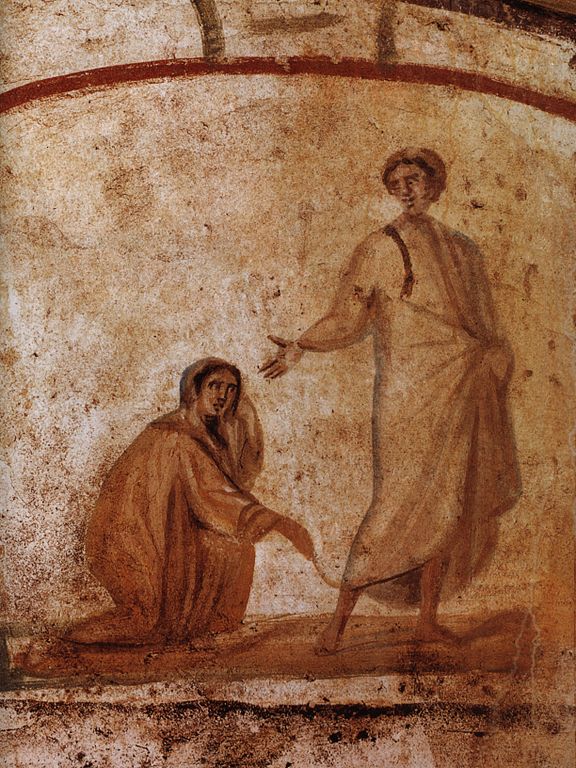
In Luke 8, we find Jesus healing a woman with an issue of blood that has persisted for twelve years straight without end. We also find Jesus raising a synagogue ruler’s daughter from the dead (See Luke 8:40-56). Both the woman and the daughter are beyond hope by human standards. The woman has spent all her resources on trying to stop the blood flow, but to no avail. The religious ruler’s daughter is near death, and later dies. But rather than be paralyzed by fear, the woman and the synagogue ruler believe in Jesus’ word and power to heal. As the old saying goes, the only thing to fear is fear itself. Be wary of fear and be aware of the need for faith.
The woman with the issue of blood is so desperate that she breaks the Law, which insists that a woman with a blood flow be isolated for seven days. Anyone who touches her during this time would be unclean (Leviticus 15:19; the uncleanness extends to that which she lies or sits on during this time—see: Leviticus 15:20). God does not take such uncleanness lightly, comparing Israel’s defilement before God to a woman during her menstrual cycle (See Ezekiel 36:17). Given that this woman never stops bleeding, she is in constant isolation. She is unwell, broke, lonely, and shunned. Her desperation leads her to bank everything on Jesus. Given her desperation, her fear of being shunned or being condemned for breaking the Law does not keep her from reaching out and touching the fringe of Jesus’ garment. She believes that just this touch is enough to heal her. She is right. The touch in faith heals her. Jesus does not condemn or shun this woman. While he leads her to make public confession, he follows it with a public declaration: “Daughter, your faith has made you well; go in peace” (Luke 8:48; ESV). Jesus welcomes her back into the community of faith as pure, and as one of his own family of faith members.
The synagogue ruler named Jairus may or may not know about Jesus having just returned from exorcising a legion of demons from a Gentile man in the vicinity of a herd of pigs. But he does know about the woman with the issue of blood. Jesus is now ceremoniously unclean as a result of the woman touching him. However, the ruler is so desperate that he does not try to forbid Jesus from interacting with the woman, or later from entering his house. Although the mourners mock Jesus, he and his wife hold out hope when Jesus tells them: “Do not fear; only believe, and she will be well” (Luke 8:50; ESV). Their faith is rewarded, as Jesus raises their daughter from the dead.
This woman and the synagogue ruler demonstrate awareness of the need for faith. They stand in stark contrast to the disciples whose fear keeps them from faith in the face of the storm and its stilling (Luke 8:25). The woman and the synagogue ruler also stand in stark contrast to the people in the surrounding area whose fear keeps them from faith as they come face to face with Jesus and the once demon-possessed man who is now still and in his right mind (Luke 8:35, 37). The woman and the synagogue ruler model the kind of response to Jesus, his life and his word that the parable of the sower envisions: “As for that in the good soil, they are those who, hearing the word, hold it fast in an honest and good heart, and bear fruit with patience” (Luke 8:15).[1]
There are many things that we are afraid of in life, from terror attacks to diseases, to torrential storms, and a host of other concerns. In situations where we are most prone to fear, we need to become more alert and note these are the very times when we are most in need of faith in Jesus who can calm storms, exorcize demons, make people ceremonially pure, and raise the dead. So, will we be the kind of people who are wary of fear, and aware of the need for faith in Jesus and his word? Or will we be the kind of people whose fears take over and destroy our faith?
This post is the fourth in a series of posts addressing the theme of awareness and wariness. Follow the links for the first, second, and third posts.
________________
[1] I very much appreciate Joel Green’s exposition of this passage. You can read it here.












